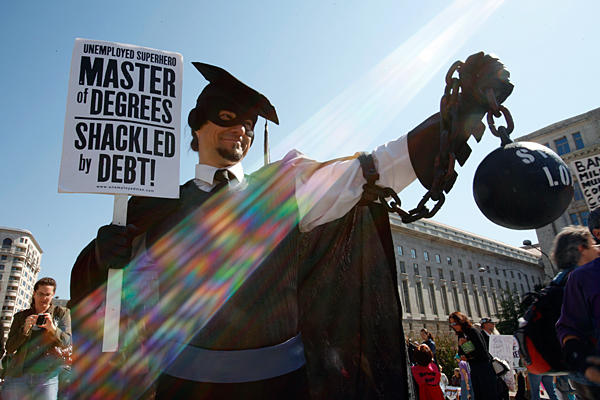Mark Twain famously said, “Cauliflower is nothing but cabbage with a college education.”
And that cabbage today would be jobless and in debt — hundreds of thousands of dollars in debt.
Not a very successful cultivar.
The New York Times published a very telling series on this crisis — with students, not cabbage — called “Degrees of Debt.”
The Times reported that 94 percent of students who earn a bachelor’s degree borrow money — through federal and private loans and from relatives — to pay for higher education. That’s up from 45 percent in 1993.
In 2011, the average college debt level was $23,300 but 10 percent of graduates owed more than $54,000 and 3 percent owed more than $100,000. What 22-year-old can pay back $100,000 in loans — with interest — fresh out of college? It’s no wonder 1 in 10 borrowers who started repaying loans in 2009 defaulted within two years.
The series featured a recent graduate of Ohio Northern who owned more than $100,000 in student debt. Her monthly payment was more than $900 a month and she was earning just $225 a week working two waitressing jobs while she continued to look for a “real” job.
That’s insane.
I’ve been out of graduate school for more than 10 years and I’m still paying student loans. It’s not $900 a month, but it’s still money that I could use for other things like, oh, rent and groceries.
It took me awhile to come to terms with the amount of money I’m paying each month toward a degree I already have in hand. I realize now — years later — how valuable that education is, that if I can make more a month than my monthly student loan payments, I was doing alright, the degree was worthwhile.
But I can’t say that for everyone.
I have friends who are still paying student loans and not working in their degree fields or — worse — not working at all. There are some who are paying off these loans and other loans, including business loans and mortgages.
You can see why we’re a generation that feels overwhelmed.
As much as it hurt to write that check every month, I can honestly say it was worth it. The experience I had, the friends I made, the learning that took place — all of it was worth the monthly payment I’m still making.
Anyone got a horror story about student loans to share? Do you think college is too expensive? Dish here!





10 Comments
I never went to college because I couldn’t afford to. So the student loan payment dilemma is lost on me.
But I have lots of friends facing that (sadly) all-to-common conundrum right now. The ones I feel really sorry for are the folks who went to college and didn’t realize they were seeking a degree in a career field they simply weren’t cut out for. Now they are swimming debt and don’t really even have anything to look forward to.
Many of them choose to go back to school…
It’s hard to believe that anyone can even really know what they want to do with the rest of their lives at the age of 18. Higher education has come to resemble a business where students are merely customers. And like everything else in the world, the price is going up in J-curve fashion.
The system could use some government reform in my opinion.
Hey, we tried to make universal healthcare, why not universal higher education. Isn’t a better educated society the secret to a stronger nation? Ask Singapore and other well educated nations. China is building a lot of schools and people are getting smarter… look where they are after twenty years of this.
Our system is set up so the rich get richer… period. Rich dad sends son to Harvard, son gets cushy job and one day sends his son to Harvard. Rinse and repeat. It used to be average Joe could aspire to this. Not any more.
My solution is to allow students to pay off their debt and get paid by performing services to underserved communities. For example, we used to have a program called the National Health Service Corp (back in the 70’s). Medical students could pay off their loans by providing medical services in medically underserved ares like inner cities or rural settings. They got paid, but the debt was forgiven. Now our system makes students take out loans that are guaranteed by the Federal government, but only make banks richer. The loans cannot be defaulted on, so even if one goes bankrupt, the loan still has to be repaid.
So why not let the government loan the money directly, then when the student graduates, they do year for year service and the loan is forgiven, services get provided to people in need and the students get good practical job experience rather than waiting tables (not that there is anything wrong with that) or living off their parents. They get paid a living wage, not top dollar, but at least have a job. The money for salaries would could come from entitlement funds, grants and contracts that pay for services to communities in need anyway. I think this plan would be a real win-win. Anyway, my two cents on the matter.
Good Morning Cat,
Back in my parents’ (your grandparents) day, common to many families in Hawaii, the men were blue collar & women would work either in service related jobs or be stay at home moms. The GI bill furthered the aspirations of many to join the ranks of white collar professionals. Women’s lib would accomplish much the same for girls getting out of high school. While I would never diminish the importance of working like our parents, isn’t it so much of a life-altering experience learning about other cultures & fields while at university? I wouldn’t trade it for a million bucks. That said, I went to UH at Manoa when tuition ran $240.00 per semester (no typo)! Sorry…
Actually, tuition was $225. Fees were added on top of that, making us write checks for $240.40 each semester.
I stand corrected. Great recall of a great value!
Hello Cat!
So far I been lucky with my kids in college. My daughter graduated from UH Manoa a few years ago and she didn’t have to make a loan. My son will be a sophomore in the fall at HPU and he got scholarships and grants for 4 years and that brought the tuition balance way down so it’s been manageable.
Great article Cat.
I just wanted to point out that The Higher Education Act of 1965 (one part of the act was to use federal funding to make college affordable to all Americans) was not renewed by the Bush (W.) administration in 2000 to appropriate more funds to our defense budget…keep in mind this was even before 9/11.
The Obama administration renewed the Act when he took office in 2008, but because his term goal was to enact the universal health care program, the money he appropriated to the Act was far less than adequate. Unfortunately, the Act doesn’t come up for renewal until 2013…so until then, we won’t see any change to the affordability of higher education, unless a new bill is introduced before.
Hi Cat!
Story of my life and I read this article in the Times, what are the odds? With graduation soon approaching, I can easily relate. I just had a conversation with a friend tonight if getting a higher education is really worth all the debt you accrue. We hate the idea of loans and yet we keep wanting to go back. Catch-22…
But despite the headaches and sleepless nights on what my next steps will be, I wouldn’t change this experience for the world.
It’s cheaper to lie, like that CEO of Yahoo. The hell with college. Save thousands of dollars, just state you got your MBA from Harvard or Yale. Companies will soon be offering executive level positions to you . If the truth comes out, you’ll still be set for life, have guaranteed stock options worth millions, etc.